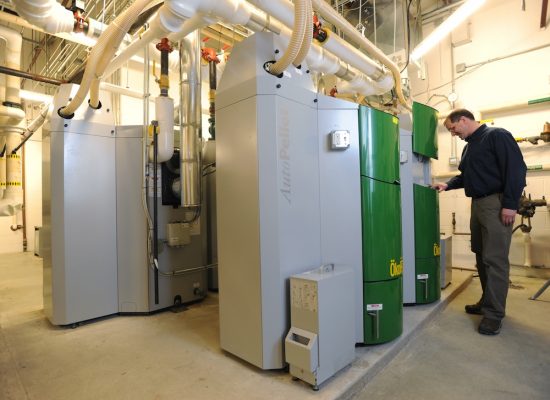
WPAC progresses biomass boiler certification project
September 13, 2019
By Wood Pellet Association of Canada
 A facilities manager monitors MESys/ÖkoFEN three boiler cascade producing up to 168 kW (573,000 BTU/hour) of thermal output and modulating down to 17kW (57,000 BTU). Photo courtesy Maine Energy Systems.
A facilities manager monitors MESys/ÖkoFEN three boiler cascade producing up to 168 kW (573,000 BTU/hour) of thermal output and modulating down to 17kW (57,000 BTU). Photo courtesy Maine Energy Systems.
For the past year or so, the Wood Pellet Association of Canada (WPAC) has been working on trying to get European biomass boiler standards accepted in Canada so that we can grow our domestic pellet market. There are no Canadian manufacturers of small scale wood pellet boilers.
We have made more progress since our last report.
On June 17, 18, WPAC was well represented at a Clean Fuel Standards Workshop in Ottawa. The Solid Fuels Sub-working Group allowed WPAC executive director Gord Murray to share WPAC’s vision for increased pellet central heating. WPAC submitted a recommendations paper to the Clean Fuels Standards Workshop organizers that focused on removal of the existing regulatory barriers, carbon credits for fuel switching, grants and low interest loans for boiler/furnace purchases, creation of bulk distribution systems, pellet heating for government buildings, and government education of the public.
WPAC held a number of meetings related to the boiler certification project while in Ottawa. Gord made a convincing presentation about the benefits of pellet central heating to a large number of NRCan employees. WPAC’s consultant Dutch Dresser met with Christine Spadey, of NRCan, and Megan Masters of the Treasury Board to help them more fully understand the issues related to boiler regulation and EU boiler importation. Megan plans to attend the September WPAC Conference in Ottawa.
Dutch met with Marta Middlebro’, Trade Affairs Manager, for the Delegation of the European Union to Canada. Marta had become aware of the project through the European Commission and was interested in learning more. She supports our effort and plans to attend the September WPAC Conference in Ottawa.
On July 9, Dutch participated in a CSA B51 Pressure Vessel Sub-committee meeting chaired by Cathy Turylo of TSSA. The meeting of Chief Boiler Inspectors showed strong support for modernization of the standards with particular interest in allowing for provincial diversity by creating annexes of possible modifications for provinces and territories to adopt at their choosing. This could be a good opportunity for us as the PEI non-ASME boiler approval annex could serve as a model for other provinces and territories.
In July, Dutch prepared the paper “CSA and EN Boiler standards review” to respond to questions raised by the European Commission in Brussels about our request for support. The EC is supportive of our efforts and has an EN 303-5 expert prepared to help as needed.
In August, in response to a request from Chairwoman Turylo, Dutch prepared a paper for the CSA B51 Pressure Vessel Sub-committee outlining the differences between pellet boilers and other biomass boilers and drawing attention to the issues created by the ASME requirements in CSA B51.
In August, WPAC was represented by Dutch and Fahimeh Yazdan Panah in a webinar hosted by ISED (Innovation, Science and Economic Development Canada), in partnership with TBS and the Standards Council of Canada (SCC). The webinar was for stakeholders interested in the second round of Targeted Regulatory Reviews conducted by the Technical Barriers and Regulations Division of Global Affairs Canada. In response to the webinar, WPAC has presented a paper requesting federal recognition of EN 303-5(18) as suitable for application for Canadian Registration Numbers.
Preparations have been made for a panel on September 25, at the WPAC Conference in Ottawa entitled “Harmonizing Canadian and European Biomass Boiler Standards.” Presenters will be Dutch Dresser, WPAC; Lindsay Veinotte, Shaw Resources; Steven Townsend, Chief Boiler Inspector, PEI; Martin Bentele, German Energy Wood and Pellet Association; and, Jamie Stephen, Torchlight Bioresources. Many government officials have been invited to attend the presentation.
In summary, summer has been an active time of coalition building for the Pellet Boiler Certification Project. The conference will provide an opportunity for the case to be made to some officials of the importance of providing this importation opportunity to Canadian businesses and end-users.
Print this page